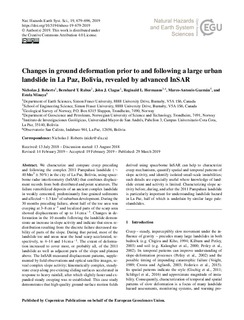Changes in ground deformation prior to and following a large urban landslide in la Paz, Bolivia, revealed by advanced InSAR
Roberts, Nicholas J.; Rabus, Bernhard T; Clague, John J.; Hermanns, Reginald; Guzman, Marco-Antonio; Minaya, Estela
Journal article, Peer reviewed
Published version
Permanent lenke
http://hdl.handle.net/11250/2618896Utgivelsesdato
2019Metadata
Vis full innførselSamlinger
Originalversjon
Natural hazards and earth system sciences. 2019, 19 (3), 679-696. 10.5194/nhess-19-679-2019Sammendrag
We characterize and compare creep preceding and following the complex 2011 Pampahasi landslide (∼40 Mm3±50 %) in the city of La Paz, Bolivia, using spaceborne radar interferometry (InSAR) that combines displacement records from both distributed and point scatterers. The failure remobilized deposits of an ancient complex landslide in weakly cemented, predominantly fine-grained sediments and affected ∼1.5 km2 of suburban development. During the 30 months preceding failure, about half of the toe area was creeping at 3–8 cm a−1 and localized parts of the scarp area showed displacements of up to 14 cm a−1. Changes in deformation in the 10 months following the landslide demonstrate an increase in slope activity and indicate that stress redistribution resulting from the discrete failure decreased stability of parts of the slope. During that period, most of the landslide toe and areas near the head scarp accelerated, respectively, to 4–14 and 14 cm a−1. The extent of deformation increased to cover most, or probably all, of the 2011 landslide as well as adjacent parts of the slope and plateau above. The InSAR-measured displacement patterns, supplemented by field observations and optical satellite images, reveal complex slope activity; kinematically complex, steady-state creep along pre-existing sliding surfaces accelerated in response to heavy rainfall, after which slightly faster and expanded steady creeping was re-established. This case study demonstrates that high-quality ground-surface motion fields derived using spaceborne InSAR can help to characterize creep mechanisms, quantify spatial and temporal patterns of slope activity, and identify isolated small-scale instabilities; such details are especially useful where knowledge of landslide extent and activity is limited. Characterizing slope activity before, during, and after the 2011 Pampahasi landslide is particularly important for understanding landslide hazard in La Paz, half of which is underlain by similar large paleolandslides.

